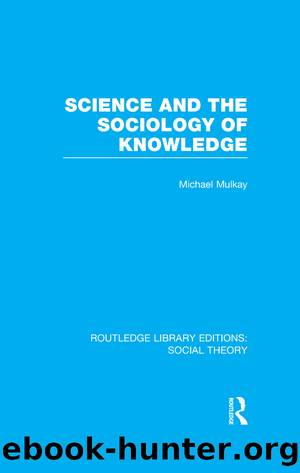Science and the Sociology of Knowledge (RLE Social Theory) by Michael Mulkay

Author:Michael Mulkay [Mulkay, Michael]
Language: eng
Format: epub
Tags: Social Science, Sociology, General
ISBN: 9781317651185
Google: -oM9BAAAQBAJ
Publisher: Routledge
Published: 2014-08-07T05:57:27+00:00
THE DYNAMICS OF KNOWLEDGE-PRODUCTION
When we examine the overall growth of modern science one thing stands out clearly, namely, that there has been a continuous creation of new areas of investigation and new realms of knowledge (Price, 1963). In the seventeenth century, the entire physical world fell within the scope of ânatural philosophyâ; and one man could encompass in his studies the full range of available knowledge. By the end of the nineteenth century this had become quite impossible. Knowledge of the natural world had become much more extensive as well as more detailed and complex (Mason, 1962); and the major scientific disciplines had crystallised into more or less distinct intellectual domains, each of which was separately established in the centres of higher learning with control over professional training and over access to its own area of knowledge. This process of intellectual and social differentiation has continued up to the present day; so that now each discipline is further sub-divided into many specialties. Each of these specialties is composed, in turn, of numerous specific areas of research, most of which deal with phenomena unknown a generation before. It is true that some of the most well-known advances in scientific thought have not involved differentiation so much as the reconceptualisation of existing bodies of knowledge (Kuhn, 1962). Nevertheless, to a very considerable extent, scientific knowledge has developed by the identification and detailed investigation of phenomena which have not been known to exist previously or which have not been studied before in any depth. The typical pattern of growth, then, in science is not the revolutionary overthrow of an entrenched orthodoxy, but the creation and exploration of a new area of ignorance (Holton, 1973, ch. 12). Within many such areas there occurs a gradual movement through three discernible, although overlapping, stages; that is, from an initial phase of exploration, through a stage of unification and into a final period of decline (Mulkay, Gilbert and Woolgar, 1975). Although this sequence is by no means inevitable (Law, 1976), it is characteristic of most areas where consensus, and therefore certified knowledge, is actually achieved.
If we are to understand how scientific knowledge is socially produced, there are advantages in concentrating particularly on the early stages in the recurrent movement towards intellectual consensus in science. Collins elucidates this point with the help of an analogy.
When we consider the grounds of knowledge, we do it within an environment filled with objects of knowledge which are already established. To speak figuratively, it is as though epistemologists are concerned with the characteristics of ships (knowledge) in bottles (validity) while living in a world where all ships are already in bottles with the glue dried and the strings cut. A ship within a bottle is a natural object in this world, and because there is no way to reverse the process, it is not easy to accept that the ship was ever just a bundle of sticks. Most perceptions of the grounds of knowledge are structured in ways derived from this perspective. (1975, p.
Download
This site does not store any files on its server. We only index and link to content provided by other sites. Please contact the content providers to delete copyright contents if any and email us, we'll remove relevant links or contents immediately.
Collaborating with Parents for Early School Success : The Achieving-Behaving-Caring Program by Stephanie H. McConaughy; Pam Kay; Julie A. Welkowitz; Kim Hewitt; Martha D. Fitzgerald(897)
Entrepreneurship Education and Training: The Issue of Effectiveness by Colette Henry Frances Hill Claire Leitch(665)
Adding Value to Policy Analysis and Advice by Claudia Scott; Karen Baehler(499)
Materializing the Middle Passage by Jane Webster;(496)
Race and American Political Development by unknow(488)
Sociological Perspectives of Health and Illness by Constantinos N. Phellas(478)
American Government and Politics Today by Steffen W. Schmidt Mack C. Shelley Barbara A. Bardes(475)
Human and Global Security : An Exploration of Terms by Peter Stoett(460)
Control Of Oil - Hardback by Kayal(457)
The Disappearance of Rituals: A Topology of the Present by Byung-Chul Han(398)
Advances in Child Development and Behavior, Volume 37 by Patricia J. Bauer(396)
The Catholic Church and European State Formation, AD 1000-1500 by Jørgen Møller(388)
The World According to China by Elizabeth C. Economy(379)
Theories of Counseling and Psychotherapy: A Case Approach by Nancy L. Murdock(370)
Left Is Not Woke by Susan Neiman(367)
Application of classical statistics, logratio transformation and multifractal approaches to delineate geochemical anomalies in the Zarshuran gold district, NW Iran by unknow(362)
Turkey's Relations with the West and the Turkic Republics: The Rise and Fall of the Turkish Model by Idris Bal(352)
Cross-Cultural Child Development for Social Workers by Lena Robinson(348)
Japan's Ainu Minority in Tokyo by Mark K. Watson(331)
